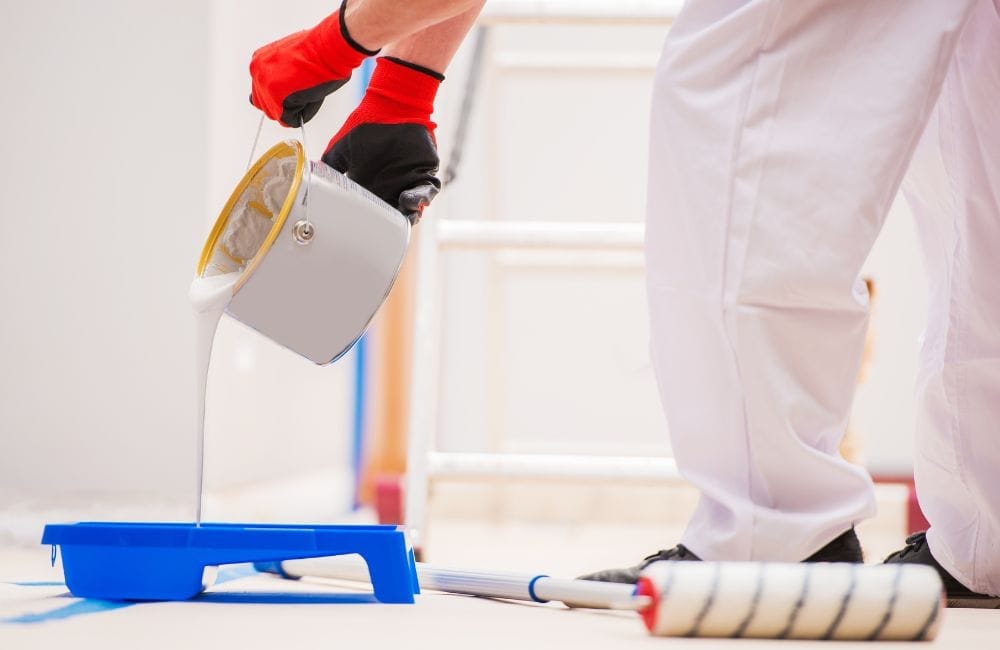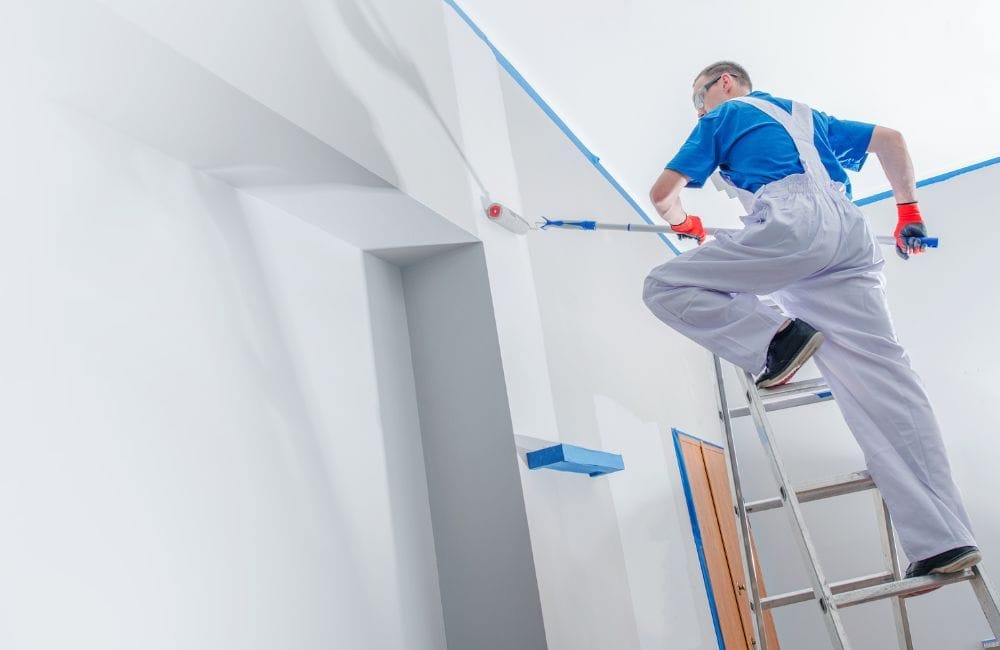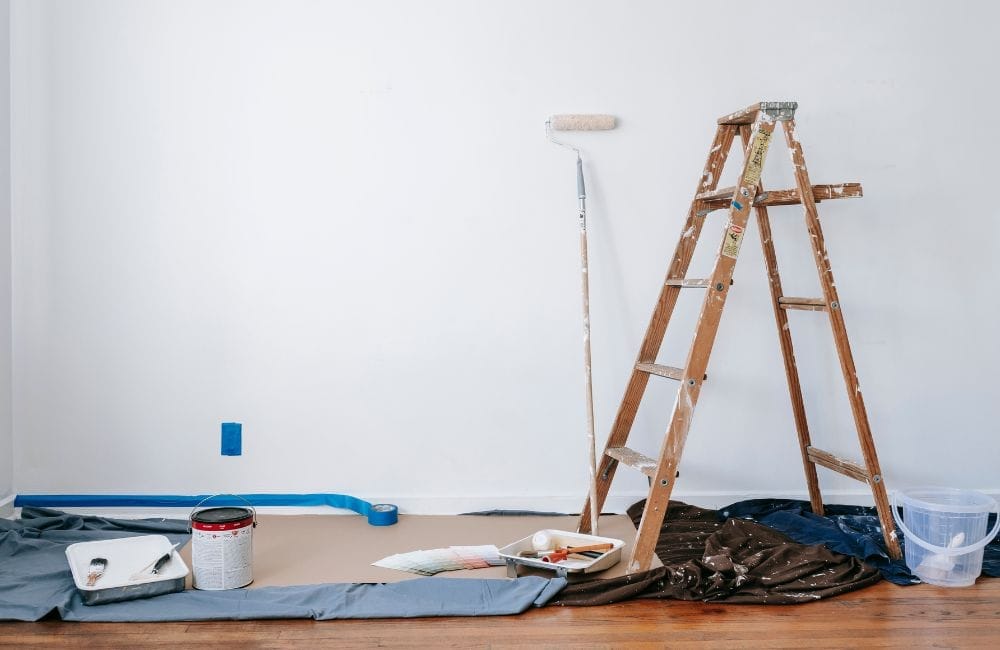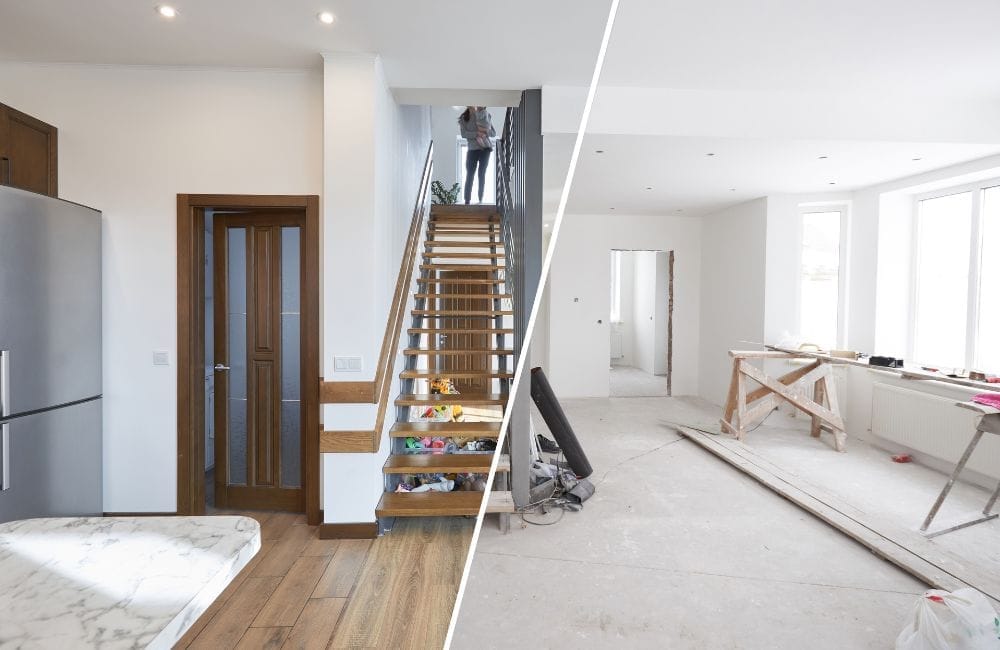
6 Tips for Hiring the Right House Painters for Your Basement Project
Table of Contents
Key Takeaways✔ Define what needs painting and any specific finishes. ✔ Seek painters with solid reviews and a good local reputation. ✔ Confirm licensing and insurance for added protection. ✔ Ask for quotes for better decision-making. ✔ Discuss space protection and their cleanup plan. ✔ Ensure the contract covers costs, timelines, and warranties. |
Hiring the right house painters for a basement project is essential to creating a space that’s both beautiful and functional while adding value to a home. A well-painted basement not only enhances its comfort and appeal but can also offer a solid return on investment. In fact, for every $1,000 spent on a basement refinish, homeowners can expect to recoup around $700 in home value. With this in mind, finding skilled, reliable painters is key to maximizing both the aesthetic and financial benefits.
Here are six expert tips in hiring the right house painters for basement projects.
6 Essential Tips for Hiring Basement Painters
1. Define Project Scope and Goals
Hiring the right house painters for a basement project begins with understanding the specifics of the job. By identifying the key areas and requirements in advance, homeowners can ensure a smoother, more efficient painting process. Outlining these project goals provides clarity and guidance, enabling house painters to deliver the desired results.
Identify Areas to be Painted
To kick off the basement painting project, it’s essential to identify the specific surfaces and areas that require painting. House painters can tailor their approach to the unique layout of each basement by defining which surfaces need attention.
- Walls: Consider if all walls need painting or just specific sections.
- Ceiling: Painting the ceiling can enhance lighting and the sense of space.
- Floor: Painting floors can be an option if a durable finish is required.
- Trim and Doors: Including trims, doors, and baseboards in the scope adds a complete, polished look to the project.
- Walls: Consider if all walls need painting or just specific sections.
Decide on Colors, Finishes, and Techniques
Colors, finishes, and paint techniques can drastically influence the look and feel of a basement. House painters rely on the chosen palette and finish to guide material selection and painting techniques.
- Colors: Select colors that complement the basement’s purpose (e.g., bright tones for recreation spaces, muted tones for storage areas).
- Finishes: Decide between finishes like matte, semi-gloss, or high gloss, depending on durability needs and the desired aesthetic.
- Techniques: Decorative techniques, such as textured paint or color blocking, can add character and depth to the space.
- Colors: Select colors that complement the basement’s purpose (e.g., bright tones for recreation spaces, muted tones for storage areas).
Determine Additional Project Requirements
Beyond aesthetics, there may be practical considerations essential to the basement’s function and longevity. By addressing these factors, house painters can ensure the basement remains attractive and resilient over time.
- Repairs: If walls have cracks, holes, or water damage, consider necessary repairs before painting to create a smooth, even surface.
- Mold-Resistant Paint: For basements prone to moisture, mold-resistant paint can protect surfaces from mold and mildew, ensuring a cleaner, healthier space.
- Waterproofing: In basements where dampness is an issue, waterproofing paint can serve as an added layer of protection.
- Repairs: If walls have cracks, holes, or water damage, consider necessary repairs before painting to create a smooth, even surface.
2. Research Qualified Painters
Hiring skilled and reputable house painters is essential to achieving a polished, long-lasting finish in any basement project. To ensure quality results, homeowners should focus on finding professionals who are experienced, trustworthy, and well-regarded in the community. Research is crucial for identifying painters who meet high standards and can handle the unique challenges of basement environments.
Look for House Painters with Positive Reviews and a Strong Reputation
Online reviews and testimonials from previous clients provide valuable insights into a painter’s work quality, professionalism, and reliability. A good reputation can often be a reliable indicator of a painter’s ability to deliver excellent results consistently.
- Local Reviews: Check reviews on trusted platforms such as Google, Yelp, or specialized contractor review sites. Positive feedback on these sites often reflects consistent performance and customer satisfaction.
- Social Media Feedback: Platforms like Facebook and Instagram may feature reviews and comments from local homeowners, along with photos of completed projects. Visual examples can showcase the painter’s style and attention to detail.
- Word-of-Mouth Recommendations: Ask neighbors, friends, or family members who have had similar projects for their recommendations. Referrals from trusted sources are often among the best indicators of a painter’s reliability.
- Local Reviews: Check reviews on trusted platforms such as Google, Yelp, or specialized contractor review sites. Positive feedback on these sites often reflects consistent performance and customer satisfaction.
Seek Recommendations from Professional Organizations
Professional organizations maintain high standards for their members, which can be an effective filter in finding experienced house painters. Membership in such organizations often indicates a painter’s dedication to quality and ongoing industry education.
- Painting Contractors Associations: Organizations like the Painting Contractors Association (PCA) offer directories of licensed, vetted painters. Painters affiliated with such organizations are typically well-trained and adhere to industry best practices.
- Local Business Chambers: Local chambers of commerce often have directories of recommended businesses, including house painters. These listings can serve as additional validation of a painter’s reputation within the local community.
- Better Business Bureau (BBB): The BBB provides ratings and reviews based on client feedback and complaint resolution history. A high BBB rating often indicates consistent reliability and customer satisfaction.
Considerations When Reviewing House Painters
While researching, homeowners should be thorough in their vetting process to avoid potential pitfalls. Key factors, such as experience level and attention to client needs, can make a substantial difference in the project outcome.
- Years of Experience in Basement Projects: House painters with experience in basements understand the specific conditions (e.g., low light, potential moisture) that can impact paint application and durability.
- Specialization in Residential Projects: Some painters specialize in residential properties and may be more attuned to interior details that are important to homeowners, such as neat edges, uniform finishes, and protecting furniture and flooring.
- Availability of Portfolio and References: A reputable painter should be able to provide a portfolio of recent work and references from past clients. These resources give homeowners a tangible sense of the painter’s quality, style, and reliability.
- Years of Experience in Basement Projects: House painters with experience in basements understand the specific conditions (e.g., low light, potential moisture) that can impact paint application and durability.
Remember to Evaluate Compatibility with Project Needs
Finding the right house painters isn’t just about technical skills. Homeowners should seek professionals who understand and align with their vision, goals, and expectations for the basement project.
- Willingness to Discuss Project Details: Quality house painters will take the time to discuss specific project requirements and recommend solutions that suit the homeowner’s budget and desired aesthetic.
- Communication and Responsiveness: Clear communication is essential in any home improvement project. Reliable painters respond promptly to inquiries, provide detailed answers, and make it easy for homeowners to reach them throughout the project.
- Flexibility and Problem-Solving Skills: Basements often pose unique challenges, from damp walls to uneven surfaces. Painters with a problem-solving approach can adapt techniques to ensure that the paint adheres properly and looks professional.
- Willingness to Discuss Project Details: Quality house painters will take the time to discuss specific project requirements and recommend solutions that suit the homeowner’s budget and desired aesthetic.

3. Verify Licensing and Insurance
Hiring the right house painters for a basement project involves ensuring they meet necessary professional standards. Verifying both licensing and insurance offers reassurance that the job will be handled responsibly and that the painter is qualified to work in the homeowner’s area.
Confirm Proper Licensing
Before hiring house painters, confirming they have the correct licenses to operate locally is essential.
- Local and State Requirements: Make sure the house painter’s license complies with local or state regulations, as these can vary widely.
- Valid and Up-to-Date: Verify that the license is not only valid but also current, avoiding expired or outdated documentation.
- Specialization in Painting: Some house painters may have general contractor licenses, but it’s crucial they have a specific license or certification in painting for the best results.
- Local and State Requirements: Make sure the house painter’s license complies with local or state regulations, as these can vary widely.
Verify Insurance Coverage
Insurance is a vital aspect of hiring house painters, as it protects both the contractor and the homeowner in case of accidents or damage during the project. Working with insured painters is a safeguard against unforeseen costs that may arise if something goes wrong.
- Liability Insurance: Confirm that the painter carries liability insurance, which covers damages to the homeowner’s property, such as spills, scratches, or accidental breaks.
- Workers’ Compensation: If the house painters have employees, ensure they carry workers’ compensation insurance to cover employee injuries sustained on the job. This prevents liability from falling on the homeowner.
- Adequate Coverage Limits: Ask about the insurance coverage limits to ensure they can cover any significant incidents that might occur, particularly for extensive basement projects that involve large spaces or intricate work.
- Liability Insurance: Confirm that the painter carries liability insurance, which covers damages to the homeowner’s property, such as spills, scratches, or accidental breaks.
4. Request Quotes
Selecting the right house painters for a basement project requires careful attention to obtaining detailed quotes. This step helps homeowners understand the full cost breakdown, services included, and an estimated timeline for completion. Given that nearly 85% of Americans have encountered unexpected or hidden fees for services in the past two years, according to a recent Consumer Reports survey of over 2,000 U.S. adults, it’s especially important to request transparent and comprehensive quotes to avoid surprises.
Requesting Quotes from House Painters
It’s wise to approach at least three house painters for quotes to get a well-rounded view of the market rates and available services. Homeowners should be prepared to share details about the basement project to receive accurate and relevant estimates.
- Scope of Work: House painters should know the exact areas to be painted, like walls, ceilings, and trim.
- Special Requirements: If the basement needs mold-resistant or waterproof paint, mention this to ensure the quote covers all necessary materials.
- Time Frame: Include a desired start and end date, allowing painters to provide a realistic completion estimate.
- Contingency for Additional Costs: Sometimes, unanticipated issues like additional wall prep or repairs come up mid-project. The contract should specify how any extra costs will be handled and if the homeowner must be notified before proceeding.
- Scope of Work: House painters should know the exact areas to be painted, like walls, ceilings, and trim.
Evaluating Quotes for the Best Fit
Once quotes have been gathered, evaluating them helps in identifying which house painters offer the best combination of quality, services, and value. Here’s what to look for in quote:
- Pricing Structure: Check if the quote is broken down by labor, materials, and any additional fees.
- Value for Money: A lower quote may not include essential services, while a higher quote might guarantee top-tier materials and a more meticulous approach.
- Reputation and Responsiveness: Consider each painter’s reputation, communication style, and flexibility, as these factors often reflect their approach to customer satisfaction.
- Pricing Structure: Check if the quote is broken down by labor, materials, and any additional fees.

5. Discuss Preparation and Clean-Up Process
Hiring house painters involves understanding not just the painting itself but also how the team will manage preparation and cleanup to keep the basement in great shape. Discussing these details ensures that the painting process is as smooth and mess-free as possible.
Clarify Basement Protection Measures
It’s crucial to ask the house painters about their approach to protecting the basement area. In this stage, they should outline all measures they’ll take to secure floors, walls, and belongings from potential spills or splatters. Here are common steps they should discuss.
- Covering Floors and Furniture: House painters should use drop cloths or plastic sheeting to safeguard floors and any items left in the basement.
- Taping and Masking Areas: Confirm that they’ll tape edges along walls, doors, and windows to create clean lines and prevent paint from spreading to unwanted areas.
- Ventilation Setup: Some paints require proper ventilation to reduce fumes. Ask if the painters plan to use fans or open nearby windows to keep air circulating.
- Covering Floors and Furniture: House painters should use drop cloths or plastic sheeting to safeguard floors and any items left in the basement.
Outline the Clean-Up Process
A thorough cleanup is vital after the paint job is complete. House painters should leave the basement free of any debris, dust, or residue.
- Paint Removal and Disposal: Ensure that the painters will properly dispose of any unused paint, brushes, and containers.
- Surface Cleaning: Confirm that they’ll clean surfaces of any dust or paint splatters to leave the area spotless.
- Furniture and Belongings Reset: If items were moved, house painters should have a plan to return these items to their original spots, leaving the basement ready to use.
- Paint Removal and Disposal: Ensure that the painters will properly dispose of any unused paint, brushes, and containers.
6. Review the Contract Thoroughly
Reviewing the contract is an essential step in hiring house painters. A detailed contract protects both the homeowner and the painting crew, ensuring that all expectations are clear and agreed upon.
Check for Key Details in the Contract
The contract should clearly outline all aspects of the painting project. When examining the contract, look for these important details:
- Pricing and Payment Terms: The contract should specify the cost of the project, including labor, materials, and any taxes. Confirm payment terms—whether a deposit is required upfront, with the balance due upon completion.
- Timeline and Completion Date: A well-defined timeline indicates when the project will start and the anticipated end date, helping the homeowner plan accordingly.
- Materials and Brands: Ensure that the house painters list the brands and types of paints and finishes they’ll use, along with any other materials to be included.
- Pricing and Payment Terms: The contract should specify the cost of the project, including labor, materials, and any taxes. Confirm payment terms—whether a deposit is required upfront, with the balance due upon completion.
Frequently Asked Questions
How long does basement paint take to dry?
Drying times for basement paint vary based on paint type, humidity, and ventilation in the space. Most latex or acrylic paints dry to the touch within 4 hours but may require 24 to 48 hours to fully cure, especially in humid conditions. Epoxy or waterproofing paints take longer to dry due to their thicker consistency, sometimes up to 72 hours for full curing. Increasing ventilation or using fans can speed up the process by reducing indoor humidity levels.
Should I paint my basement ceiling, and if so, what color is best?
Painting the basement ceiling is often recommended to improve lighting and create a cleaner, more cohesive look. Black or dark gray ceilings can conceal pipes and wiring while creating a modern industrial aesthetic, especially if you plan to leave the ceiling exposed. For a brighter, open feel, white or light gray ceilings reflect more light and make the space feel larger. Use flat or matte paint to hide imperfections, especially on unfinished ceilings.
Can I use regular interior paint on basement walls?
Regular interior paint is generally not recommended for basements due to their susceptibility to moisture and temperature fluctuations. Interior paint lacks the durability and moisture resistance needed for the concrete and masonry surfaces typical in basements. Using a high-quality masonry or epoxy paint ensures a longer-lasting finish that’s better suited for humid environments. If interior paint is preferred for aesthetic reasons, it should be applied over a waterproofing primer to provide extra protection. For a professional-looking, durable result, it’s best to use paint specifically made for basements.
How can I deal with moisture issues before painting?
If moisture is present, addressing it before painting is essential to avoid future peeling, bubbling, or mold growth. Start by identifying the moisture source, which could be cracks in the foundation, poor drainage, or high indoor humidity. Seal any cracks or gaps using a high-quality waterproofing filler and consider applying a moisture-resistant barrier paint as an undercoat. Improving ventilation with dehumidifiers or exhaust fans can help maintain dry conditions.
What type of paint should I use for basement walls?
For basement walls, you should ideally use paint specifically formulated for concrete or masonry surfaces, often referred to as masonry or waterproofing paint. These paints help prevent moisture from seeping through and offer a mold-resistant finish, which is essential in basements. Acrylic latex paint is popular due to its durability and flexibility, allowing it to move with the foundation as it expands and contracts. Waterproof epoxy-based paints are another good choice, especially if moisture is a primary concern, as they create a watertight seal. If your basement walls already have a layer of paint, ensure compatibility with the new paint to avoid peeling or bubbling.

Refresh Your Basement with Professional Painting Services in West Hartford, CT!
Give your basement a fresh, inviting look with the expert touch of West Hartford House Painting Experts. Specializing in high-quality residential painting, our team in West Hartford, CT, is dedicated to bringing a clean, durable finish to your basement that stands up to everyday use. From detailed preparation to a spotless cleanup, we provide everything needed to achieve a flawless result that enhances your home’s comfort and style.
Reach out to West Hartford House Painting Experts today to discuss how we can bring new life to your basement and make your vision a reality right here in West Hartford, CT.
